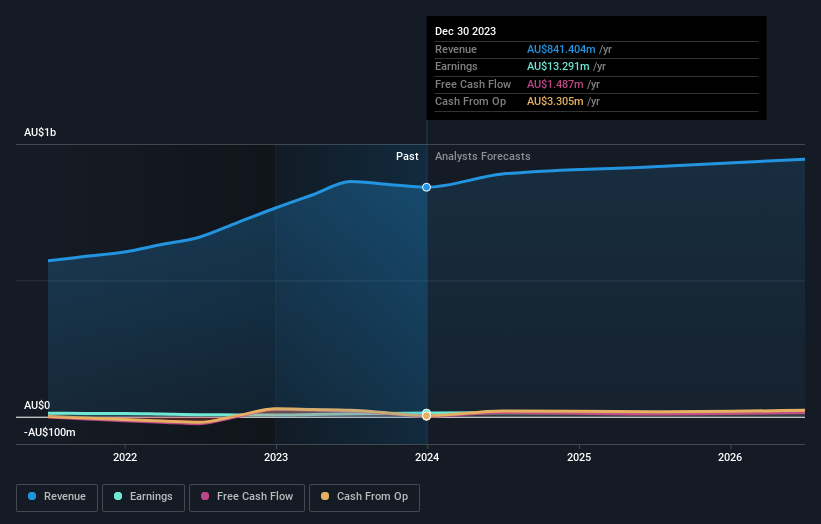SHAPE Australia Corporation Limited (ASX:SHA) insiders seem bullish, own 49% and have been buying more recently
Key Insights
Insiders appear to have a vested interest in SHAPE Australia's growth, as seen by their sizeable ownership
A total of 5 investors have a majority stake in the company with 56% ownership
If you want to know who really controls SHAPE Australia Corporation Limited (ASX:SHA), then you'll have to look at the makeup of its share registry. The group holding the most number of shares in the company, around 49% to be precise, is individual insiders. In other words, the group stands to gain the most (or lose the most) from their investment into the company.
A quick look at our data suggests that insiders have been buying shares in the company recently. This could be interpreted as insiders anticipating a rise in stock prices in the near future.
Let's take a closer look to see what the different types of shareholders can tell us about SHAPE Australia.
Check out our latest analysis for SHAPE Australia
What Does The Lack Of Institutional Ownership Tell Us About SHAPE Australia?
We don't tend to see institutional investors holding stock of companies that are very risky, thinly traded, or very small. Though we do sometimes see large companies without institutions on the register, it's not particularly common.
There could be various reasons why no institutions own shares in a company. Typically, small, newly listed companies don't attract much attention from fund managers, because it would not be possible for large fund managers to build a meaningful position in the company. On the other hand, it's always possible that professional investors are avoiding a company because they don't think it's the best place for their money. SHAPE Australia's earnings and revenue track record (below) may not be compelling to institutional investors -- or they simply might not have looked at the business closely.
We note that hedge funds don't have a meaningful investment in SHAPE Australia. Our data shows that Biramont Pty Ltd is the largest shareholder with 18% of shares outstanding. The second and third largest shareholders are John Drayton and Gerard McMahon, with an equal amount of shares to their name at 12%. In addition, we found that Peter Marix-Evans, the CEO has 1.6% of the shares allocated to their name.
Our research also brought to light the fact that roughly 56% of the company is controlled by the top 5 shareholders suggesting that these owners wield significant influence on the business.
While studying institutional ownership for a company can add value to your research, it is also a good practice to research analyst recommendations to get a deeper understand of a stock's expected performance. While there is some analyst coverage, the company is probably not widely covered. So it could gain more attention, down the track.
Insider Ownership Of SHAPE Australia
While the precise definition of an insider can be subjective, almost everyone considers board members to be insiders. Management ultimately answers to the board. However, it is not uncommon for managers to be executive board members, especially if they are a founder or the CEO.
Most consider insider ownership a positive because it can indicate the board is well aligned with other shareholders. However, on some occasions too much power is concentrated within this group.
Our information suggests that insiders maintain a significant holding in SHAPE Australia Corporation Limited. It has a market capitalization of just AU$185m, and insiders have AU$91m worth of shares in their own names. We would say this shows alignment with shareholders, but it is worth noting that the company is still quite small; some insiders may have founded the business. You can click here to see if those insiders have been buying or selling.
General Public Ownership
The general public, who are usually individual investors, hold a 15% stake in SHAPE Australia. While this group can't necessarily call the shots, it can certainly have a real influence on how the company is run.
Private Company Ownership
We can see that Private Companies own 36%, of the shares on issue. It's hard to draw any conclusions from this fact alone, so its worth looking into who owns those private companies. Sometimes insiders or other related parties have an interest in shares in a public company through a separate private company.
Next Steps:
It's always worth thinking about the different groups who own shares in a company. But to understand SHAPE Australia better, we need to consider many other factors. For instance, we've identified 1 warning sign for SHAPE Australia that you should be aware of.
But ultimately it is the future, not the past, that will determine how well the owners of this business will do. Therefore we think it advisable to take a look at this free report showing whether analysts are predicting a brighter future.
NB: Figures in this article are calculated using data from the last twelve months, which refer to the 12-month period ending on the last date of the month the financial statement is dated. This may not be consistent with full year annual report figures.
Have feedback on this article? Concerned about the content? Get in touch with us directly. Alternatively, email editorial-team (at) simplywallst.com.
This article by Simply Wall St is general in nature. We provide commentary based on historical data and analyst forecasts only using an unbiased methodology and our articles are not intended to be financial advice. It does not constitute a recommendation to buy or sell any stock, and does not take account of your objectives, or your financial situation. We aim to bring you long-term focused analysis driven by fundamental data. Note that our analysis may not factor in the latest price-sensitive company announcements or qualitative material. Simply Wall St has no position in any stocks mentioned.

 Yahoo Finance
Yahoo Finance 

